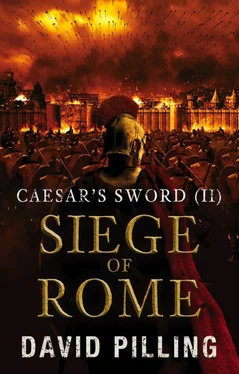David Pilling - Siege of Rome
Здесь есть возможность читать онлайн «David Pilling - Siege of Rome» весь текст электронной книги совершенно бесплатно (целиком полную версию без сокращений). В некоторых случаях можно слушать аудио, скачать через торрент в формате fb2 и присутствует краткое содержание. Год выпуска: 2013, Жанр: Исторические приключения, на английском языке. Описание произведения, (предисловие) а так же отзывы посетителей доступны на портале библиотеки ЛибКат.
- Название:Siege of Rome
- Автор:
- Жанр:
- Год:2013
- ISBN:нет данных
- Рейтинг книги:3 / 5. Голосов: 1
-
Избранное:Добавить в избранное
- Отзывы:
-
Ваша оценка:
- 60
- 1
- 2
- 3
- 4
- 5
Siege of Rome: краткое содержание, описание и аннотация
Предлагаем к чтению аннотацию, описание, краткое содержание или предисловие (зависит от того, что написал сам автор книги «Siege of Rome»). Если вы не нашли необходимую информацию о книге — напишите в комментариях, мы постараемся отыскать её.
Siege of Rome — читать онлайн бесплатно полную книгу (весь текст) целиком
Ниже представлен текст книги, разбитый по страницам. Система сохранения места последней прочитанной страницы, позволяет с удобством читать онлайн бесплатно книгу «Siege of Rome», без необходимости каждый раз заново искать на чём Вы остановились. Поставьте закладку, и сможете в любой момент перейти на страницу, на которой закончили чтение.
Интервал:
Закладка:
We were now surrounded on all sides. With every day that passed, our supplies were reduced, and fresh Gothic reinforcements were seen on the horizon. As Belisarius had predicted, his Frankish allies had sent thousands of auxiliaries to aid Vitiges, and more troops were pouring in from Dalmatia and other Gothic provinces.
The atmosphere inside the city grew desperate. Even Belisarius’ ingenious water-mills could not replenish our dwindling supplies of grain, and he was forced to halve the bread ration doled out to the citizens. Any civilization is only a few meals away from collapse, and the people of Rome were already demoralised by the long months of siege and Belisarius’ refusal to let them fight.
In their extremity, the Romans started to forget Christ and revert to their ancient gods and pagan idolatries. I watched in disbelief as people sought comfort from a particularly shameless breed of charlatan known as soothsayers, who claimed to be able to read the future in mystic omens and the spilled guts of animals.
“It’s all harmless enough,” Procopius assured me as we walked the streets together one afternoon, “let them believe in their omens and auguries. Such heathen antics are to be deplored, of course, but anything that keeps the mob quiet must also be tolerated.”
I was off-duty, and inclined to spend most of my few leisure hours in his company. His lively conversation made a welcome change from attempting to communicate with the men of my new command, a hundred rough Isaurian spearmen from the wildest and most lawless regions of their native mountains. Belisarius had seen fit to put me in charge of a detachment of infantry, either because he didn’t trust me with cavalry, or because there was nothing else available. I preferred to believe the latter.
We were walking near the Forum, the large rectangular plaza in the centre of Rome, surrounded by various splendid temples and government buildings. There were a number of soothsayers at large, emaciated men and women in patched robes, loudly proclaiming their nonsense while groups of wide-eyed, half-starved citizens looked on in fear and wonder, devouring every word.
I stopped to observe a particularly large crowd gathered in front of one of the temples. It was a small, square monument to Janus, the two-faced god who looks to the future and the past, with ornate decorations on the roof, a latticed window and double doors made of rusted iron to front and rear. A garland of twisted rope hung over the doors at the front.
“The doors to the Temple of Janus have been closed for centuries,” said Procopius, “it used to be the custom that they would stand open in times of war, and were closed in times of peace. Rome was usually at war with someone, so they more or less always stood open.”
Some demagogue was standing on an upturned barrel beside the doorway, screaming at the crowd to break the garland and smash the doors open.
“The fortunes of war have turned against us!” he bawled, spraying the mob with spittle, “and why, has this happened? Because we turned away from the old gods, who once watched over Rome during the high days of the Caesars, when our great city was the centre and heartbeat of the world!”
Some of the like-minded souls in the crowd cheered, and he raised his fist in salute. “For too long has the statue of Janus sat in darkness! He presides over the beginning and ending of wars, and there shall be no end to this war unless we open these doors and allow light into his temple!”
The mob surged forward and ripped away the garland, tearing it to pieces and stamping on it. Some of them wielded hammers and picks – I suspected that this little demonstration had been arranged beforehand – and started beating at the rusted iron doors.
“This is against the law, you know,” said Procopius, “the worship of pagan idols was abolished when the Empire formally adopted Christianity. If an officer of the law was present, he would have no choice but to arrest the culprits.”
He gave me a sly look. As a soldier, it was technically my duty to enforce the laws. I was also the only soldier in sight, and had no intention of risking my neck by standing between the Romans and their absurd deities.
In any case, the doors were rusted firmly shut, and stood up against their blows. Janus remained in darkness, and for all I know still sits inside his little temple, neglected and forgotten, biding his time until the light of Christ fades from the world and men turn back to the old ways.
There was no end to the trouble caused by these Romans, who we had been sent to rescue from barbarian slavery. Their senators, urged on by the mass of the people, continued to harass Belisarius, pleading with him to let them march out and confront the Goths. Some of his officers added their voices to the chorus, arguing that the Goths would not expect us to sally out in force.
If our men, who should have known better, had kept quiet, then Belisarius might have safely ignored the yelping of the Romans. As it was, he started to buckle. This alarmed me, for the last time he yielded to the protests of others, and gave battle against his better judgment, was at Callinicum against the Sassanids. That battle had ended in defeat, though Belisarius managed to stage a fighting retreat and save the greater part of the Roman army.
At last my fears were realised. Belisarius gave way to these combined demands, and declared his intention to march out in force and attack the Goths.
19.
Belisarius was cautious, else I would not be here now, blinking wearily at this parchment and praying for strength to ignore the rheumatic pains in my wrist. My candle burns low, and the shadows lengthen.
The general split his army in two. Led by himself, the main part sallied out of the Pincian and Salarian gates to engage the Gothic troops north of the city, while a band of cavalry under two officers named Valerian and Martinus attacked the Goths encamped west of the Tiber, on the Plains of Nero, to prevent them helping their comrades to the north.
These men were reinforced by the Roman citizens, a disorderly rabble of poorly-armed militia, and a detachment of Moorish cavalry. Belisarius did what he could to ensure that the Romans came to no harm, and gave them strict orders to act as a last-ditch reserve. They were to take up position to the rear, at the foot of the city walls, and not move unless the officers summoned them.
Belisarius spent the morning arranging his men near the gates, but waited until after midday before ordering the attack. The century of Isaurians in my charge were part of his main army, again under the overall command of Bessas, who seemed to have taken a liking to me.
Unlike the Heruls, I had little in common with the Isaurians, who I found to be sullen and intractable, and fond of playing at dumb insolence when I gave them orders. They made great play of struggling to understand my accent, cupping their ears and exchanging baffled glances when I addressed them.
At last, on the evening before the battle, I lost patience and had the chief offender tied to a barrel and flogged by two of his comrades until the blood flowed down his hairy back. After that, they seemed to regard me with a degree of grudging respect, and I felt a little more confident leading them into battle.
Cleverly, Belisarius commanded his men to stand down and take some food, hoping to deceive the Goths into thinking he had put off the attack. The ploy worked, and the Gothic squadrons arrayed for battle on the plains north of the walls started to break up.
“Open the gates!” Belisarius shouted. He and Bessas were in command of the infantry, while he had entrusted his six hundred Hunnish cavalry to a trio of officers from Persia and Thrace.
The smaller Pincian Gate was flung open, and our cavalry streamed out of the city. Bessas led the infantry through the Salarian Gate at a more orderly pace, column by column, to deploy in squadrons just beyond the outer ditch. We were not to advance, but act as a reserve to cover the retreat of our cavalry in case they were defeated and thrown back.
Читать дальшеИнтервал:
Закладка:
Похожие книги на «Siege of Rome»
Представляем Вашему вниманию похожие книги на «Siege of Rome» списком для выбора. Мы отобрали схожую по названию и смыслу литературу в надежде предоставить читателям больше вариантов отыскать новые, интересные, ещё непрочитанные произведения.
Обсуждение, отзывы о книге «Siege of Rome» и просто собственные мнения читателей. Оставьте ваши комментарии, напишите, что Вы думаете о произведении, его смысле или главных героях. Укажите что конкретно понравилось, а что нет, и почему Вы так считаете.












